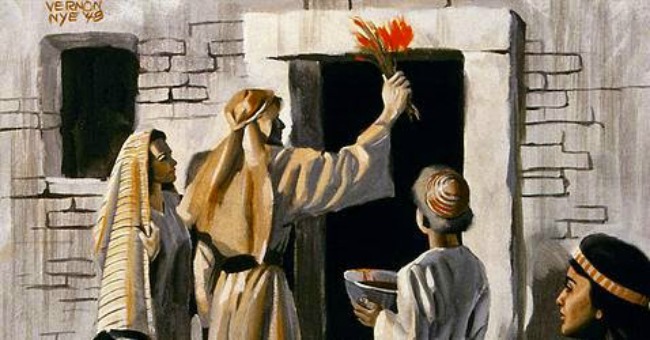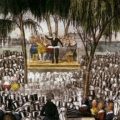Question
Gramps,
I have a question. If the families didn’t kill their unblemished sheep and put the blood on the doors and ate the meat that was roasted, who killed their first born? I’m confused because I thought it might be God but earlier in the scriptures it says that God would never hurt any of us.
Mason
Answer
Dear Mason,
The closest scripture I could find to your reference that “God would never hurt any of us” is the promise made to Noah:
“And I, behold, I establish my covenant with you, and with your seed after you; And with every living creature that is with you, of the fowl, of the cattle, and of every beast of the earth with you; from all that go out of the ark, to every beast of the earth. And I will establish my covenant with you; neither shall all flesh be cut off any more by the waters of a flood; neither shall there any more be a flood to destroy the earth” (Genesis 9:9-11).
Please note that while the covenant is applied more liberally than you stated, being broad enough to include all animals, it has the specificity to apply only to flood. That is, the Lord reserved judgment in Himself to mete it out in accordance with the divine principles of justice and mercy. We find these principles balanced in the flood account. Noah preached for 120 years (Moses 8:17), giving ample opportunity for the world to shake off its corruption. Enoch saw these days of wickedness and “as Enoch saw this, he had bitterness of soul, and wept over his brethren, and said unto the heavens: I will refuse to be comforted” (Moses 7:44). That is, Enoch views the conditions on the earth leading to the flood and like Peter concludes that the Lord is “longsuffering, … wait[ing] in the days of Noah” (1 Peter 3:20).
This attribute of judgment (coupled with justice and mercy) is essential for God. Consider for a moment a God who cannot mete judgment. Alma takes us down such a thought experiment beginning with a lawless God. “[I]f there was no law given, if men sinned what could justice do, or mercy either, for they would have no claim upon the creature?” (Alma 42:21). Such a God is impotent. He could neither save nor damn. But what if God instead eschews one of the balancing principles of justice or mercy? “[T]here is a law given, and a punishment affixed, and a repentance granted; which repentance, mercy claimeth; otherwise, justice claimeth the creature and executeth the law, and the law inflicteth the punishment; if not so, the works of justice would be destroyed” (Alma 42:21). If God ignores mercy and only metes justice, repentance means nothing and all are damned. More relevant to the question at hand, if God ignores justice and only shows mercy His law means nothing and He can be safely ignored.
We see the principle of judgment and are reminded of the flood in the rivalry between the nations of Moses and Pharaoh. The Lord sends a prophet to give Pharaoh His law: “Let my people go, that they may serve me” (Exodus 8:1). Pharaoh refuses, not once, but ten times! The Lord metes out judgment in the form of locusts, darkness, boils, frogs, and so forth. Each plague is preceded by a conditional warning: Free the Israelites or suffer the judgment. As Alma has so clearly stated, there is a law given, and a punishment affixed. If Pharaoh does not repent, then justice claims that creature and executes the law, inflicting punishment. If God does not act, He is impotent or meaningless. So act He does, but only after again showing His longsuffering. Time and again the Lord extends to Pharaoh the invitation to repent. Time and again he refuses. We see the scene unfold and like Enoch we weep.
Finally, a tenth time the law is given and refused. Pharaoh echoes Cain “Who is the Lord that I should obey his voice?” (Exodus 5:2, see Moses 5:16). While latter-day revelation states the death of the firstborn was caused by “the destroying angel” (D&C 89:21), the Lord fully owns up to the destruction: “For I will pass through the land of Egypt this night, and will smite all the firstborn in the land of Egypt, both man and beast; and against all the gods of Egypt I will execute judgment: I am the Lord” (Exodus 12:12).
Today we have prophets who, like Moses, have warned us of impending judgment. They “warn that the disintegration of the family will bring upon individuals, communities, and nations the calamities foretold by ancient and modern prophets” (The Family: A Proclamation to the World). And, like Moses, they tell us what we need to do to repent and receive mercy instead of justice: “We call upon responsible citizens and officers of government everywhere to promote those measures designed to maintain and strengthen the family as the fundamental unit of society” (read the whole document for individual warnings and repentance calls). The Lord is longsuffering, but when mercy has no claim through repentance He executes His judgment.
Gramps







